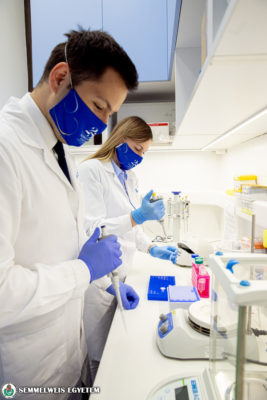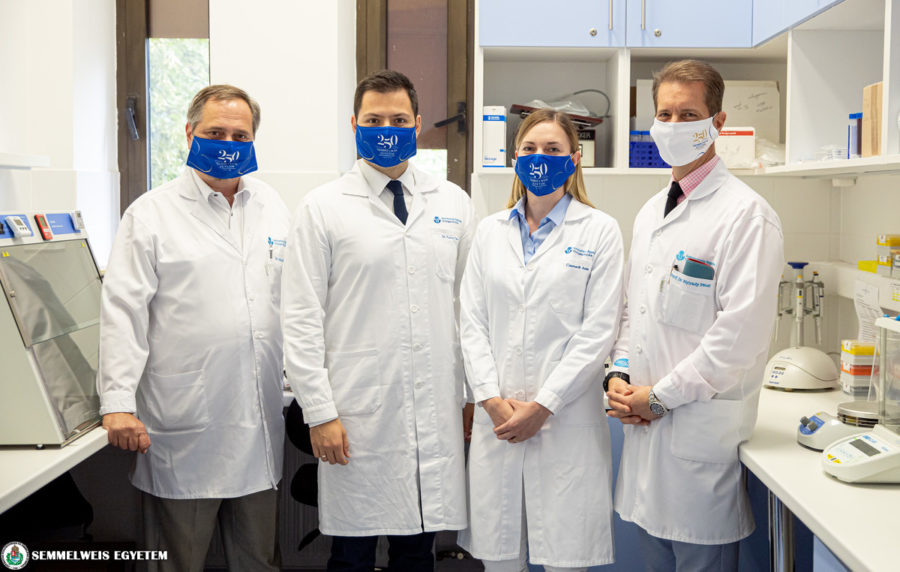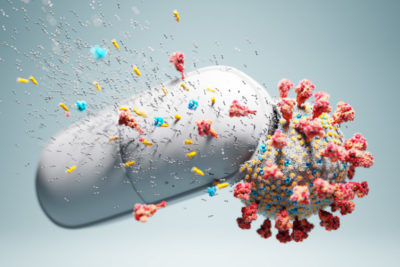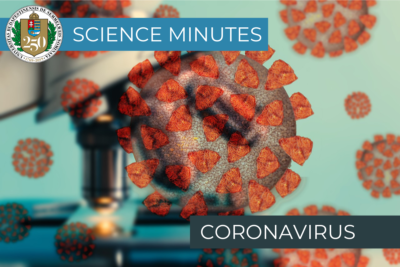A male sex hormone-regulated protein (TMPRSS2), previously discovered in the context of prostate cancer, has been found to play a key role in the entry of the coronavirus into cells. For this reason, uro-oncologist researchers around the world have raised the question of whether this is related to the higher number of male COVID-19 patients and the fact that the course of the disease is often more severe in their case. Researchers at Semmelweis University’s Department of Urology, together with the University of Essen-Duisburg, have published a scientific summary on the uro-oncological aspects of coronavirus research in the International Urology and Nephrology journal, and the clinic is launching research to determine whether the hormone deprivation therapy for prostate cancer decreases the presence of the protein at issue in the lungs.
Perhaps the most significant discovery in recent months in understanding the pathophysiology of Sars-CoV-2 has been the accurate description of the entry of the virus into the host cell. Coronavirus is able to enter the cell in the presence of two cell surface proteins, angiotensin-converting enzyme 2 (ACE2) and transmembrane serine protease 2 (TMPRSS2). The urological significance of all this is given by the fact that TMPRSS2 protein has been discovered in connection with prostate cancer, and a more detailed understanding of its function is also largely due to research on prostate cancer. This protein is regulated by male sex hormones, and its increased expression is observed in prostate cancer. It is important to mention that in more than 50 per cent of prostate tumours, the TMPRSS2 gene has a fusion mutation with the ERG gene that promotes further tumour growth.
The question of whether androgen deprivation reduces the presence of TMPRSS2 in the lungs and concomitant susceptibility to Sars-CoV-2, and whether male predominance and a more severe course of infection are associated with the regulation of the TMPRSS2 gene by male sex hormones has also been raised at the Department of Urology. A recent study examined more than 4,500 confirmed coronavirus-positive male patients in the Veneto province of Italy, one of the most affected by the virus. Based on their results, the risk of infection in people with some form of cancer was 1.8 times higher, but, interestingly, patients with androgen deprivation due to prostate cancer were found to have lower susceptibility to the disease, the course of which was also milder.
 A scientific summary was published by the staff of the Department of Urology on the uro-oncological aspects of the coronavirus.‘Based on the data, the protective role of androgen deprivation therapy (ADT) against the pathogen is likely related to the expression of the TMPRSS2 protein, which may serve as a therapeutic target for drug development in the future,’ pointed out Dr. Tamás Fazekas, first author of the review and resident at the Department of Urology. A specific inhibitor of TMPRSS2, chamostat mesylate, has been used in Japan since the 1980s to treat pancreatitis. Previous in vivo experiments of this drug in a mouse model have shown that it reduces the mortality of Sars-CoV infection, and therefore it is hypothesized that it may also be effective against Sars-CoV-2. According to the publication, the effect of the drug on the severity of Covid-19 disease is currently being studied. However, it has not yet been proven whether the treatment can reduce the presence of a coronavirus-associated protein in the lungs, so the Department of Urology is now launching new research, involving patients who have had a lung biopsy while being treated for prostate cancer.
A scientific summary was published by the staff of the Department of Urology on the uro-oncological aspects of the coronavirus.‘Based on the data, the protective role of androgen deprivation therapy (ADT) against the pathogen is likely related to the expression of the TMPRSS2 protein, which may serve as a therapeutic target for drug development in the future,’ pointed out Dr. Tamás Fazekas, first author of the review and resident at the Department of Urology. A specific inhibitor of TMPRSS2, chamostat mesylate, has been used in Japan since the 1980s to treat pancreatitis. Previous in vivo experiments of this drug in a mouse model have shown that it reduces the mortality of Sars-CoV infection, and therefore it is hypothesized that it may also be effective against Sars-CoV-2. According to the publication, the effect of the drug on the severity of Covid-19 disease is currently being studied. However, it has not yet been proven whether the treatment can reduce the presence of a coronavirus-associated protein in the lungs, so the Department of Urology is now launching new research, involving patients who have had a lung biopsy while being treated for prostate cancer.
The publication also covers the controversial BCG vaccine, which has been brought into focus by the coronavirus and also has uro-oncological implications. In urological practice, BCG chemoinstillation has been used since 1976 to treat bladder tumours. Although the exact mechanism of the treatment is still unknown in all its details, the TH1 immune response is thought to play a central role in the development of the antitumour response. Although the process results in local infiltration of white blood cells into the bladder wall, the systemic immunomodulatory effect of BCG instillation has been previously demonstrated. With all these data in mind, the question arises as to whether BCG instillation applied to bladder tumour as a booster vaccine provides protection against coronavirus infection and may reduce the risk of fatal outcome. Although the WHO says the protective effect of the vaccine is currently insufficiently substantiated, several prospective studies have been launched in recent months.
The authors of the publication in the International Urology and Nephrology journal are Dr. Tamás Fazekas, resident, Dr. Tibor Szarvas, senior researcher, Anita Csizmarik, PhD student, and Prof. Péter Nyirády, director, from the Department of Urology. The authors also include Dr. Boris Hadaschik, professor at the University of Duisburg-Essen.
Pálma Dobozi
Source: Department of Urology
Photo: Attila Kovács – Semmelweis University
Translation: Diána Módos



